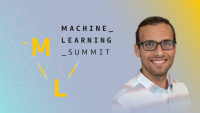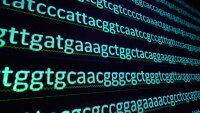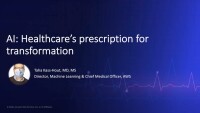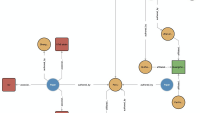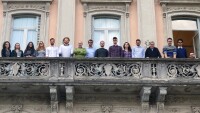Early in her career, computer scientist Marinka Zitnik confronted a biomedical mystery: among 12,000 genes, which handful played a role in the response of a model organism to bacterial infection? A genuine needle-in-a-haystack situation.

But when Zitnik fed the biomedical data into a machine learning algorithm of her own devising, it predicted eight genes most likely to be involved. When those candidates were tested in the lab, the research team found that six of them were indeed implicated in the infection. Her method had proven sensationally successful.
"As someone who was trained in computer science at the time, it was so rewarding to make an impact in another area,” says Zitnik. “It was a turning point for me.”
That turning point, in 2013, led to a decade of research in machine learning and to Zitnik's current role as assistant professor of biomedical informatics at Harvard Medical School. At Harvard's Zitnik Lab, she is focused on how machine learning can enable accurate diagnoses and the development of new treatments and therapies. And with the support of an Amazon Research Award, she is working to unlock the potential of AI-augmented drug discovery at the global scale through the online platform Therapeutics Data Commons.
Today, of course, bioinformatics is an established and growing discipline. But during Zitnik’s final year at high school it was a magic word, one she hadn’t heard before, that suddenly revealed how she could combine her passion for computers, programming, and mathematics with her ambition to make a big impact on society.
“I stumbled across a lecture given by a university recruiter, and I learned this word. Bioinformatics combines computation and biology. It was an emerging area that really sparked my interest,” says Zitnik. Following her subsequent degree in computer science and mathematics at the University of Ljubljana, Slovenia, she stayed and started a PhD in computer science in 2012, all the while with medicine in mind.
“I wanted to deeply understand the complex problems in biology and medicine that I could use computation to help solve,” Zitnik says.
Bottlenecks and challenges
Early in Zitnik’s PhD, she published several machine learning papers that were read by scientists at a variety of biomedical institutions. Many reached out to invite her to their labs to collaborate in applying her algorithms to their data. During her PhD, Zitnik joined forces with clinicians, biomedical researchers, geneticists, and computer scientists around the world, including Stanford University and Imperial College London.
“I wanted to learn about the process of fundamental biological discovery in a lab — the bottlenecks and the challenges,” she says.
One of these collaborations — with Baylor College of Medicine in Houston, Texas — was particularly encouraging: the 12,000-gene challenge. The conventional approach would have required many thousands of screening experiments, testing each gene in turn. The success of Zitnik’s algorithms meant the saving of a great deal of time and resources.
“That was the first time I saw that coupling AI predictions with experimental biological work in the lab can improve experimental yield by an order of magnitude,” says Zitnik.
Fast forward to 2019, when Zitnik arrived at Harvard University to set up her lab. Zitnik focused on two closely linked areas of medicine that could also benefit from AI. One is how machine learning can enable an accurate diagnosis for a patient based on a wide variety of information, from their genetic code and blood test results to their medical history and lifestyle data. The second area involves identifying and developing possible treatments and therapies for these diagnoses.
Therapeutics Data Commons
More than this, though, Zitnik wanted to unlock the potential of AI-augmented medicine at the global scale. From her early work with the biomedical community, she understood all too well the difficulty in accessing and curating high-quality medical data to train ML models. She addressed these twin challenges head on, leveraging Amazon Elastic Compute Cloud (EC2) and AWS ML deployment tools via her Amazon Research Award to launch Therapeutics Data Commons (TDC), an international initiative to access and evaluate AI capability across therapeutic modalities and stages of discovery.
At its core, TDC is a collection of open-source data sets and state-of-the-art ML models focused on drug discovery and development, accompanied by a broader ecosystem of resources and tools that include benchmarking and leader boards for cutting-edge ML models.
“It’s a meeting point between biomedical and biochemical researchers, and machine learning scientists,” says Zitnik. “It’s a thriving community.”
TDC is the largest open-source platform of its kind in the world. Zitnik runs it with collaborating institutions including MIT, Stanford University, Georgia Institute of Technology, Cornell University, University of Illinois Urbana-Champaign, and Carnegie Mellon University, and with additional support from the pharmaceutical industry and tech companies. TDC covers the entire process of drug discovery and development, from identifying potentially therapeutic molecules to the optimizing and planning of laboratory experiments.
The platform holds data from anonymized electronic health records, medical imaging, genomics, clinical trials data, and lots more. Biomedical researchers can use TDC’s data, or bring their own data and challenges, and collaborate with ML scientists to increase the speed of drug discovery while also reducing the otherwise enormous cost of bringing new drugs to market. It has already been used by more than 200,000 scientists worldwide, says Zitnik.
Help for rare diseases
Zitnik is also keen to use her technology to help patients and clinicians working on rare diseases. There are over 7,000 rare diseases in the world, says Zitnik. Each of them has a small number of known cases, but collectively they affect many people. Could AI help here?
To develop a diagnostic model for a common disease typically requires data from thousands of patients, labelled with that diagnosis. For rare diseases, that labelled patient data simply doesn’t exist. “This problem cannot be solved by throwing more money at it,” says Zitnik. “It requires a new way of thinking.”
Instead, Zitnik and her team, which includes postdoctoral fellow Emily Alsentzer and graduate researcher Michelle Li, are incorporating medical principles and prior scientific knowledge about biological interactions, chemistry, genetics, patient symptoms, and drug interactions into the neural architecture of their models.
“This allows us to train sophisticated deep learning models using very little amounts of labelled patient data, and sometimes no patient data at all,” says Zitnik.
A collaboration with a Harvard-led study called the Undiagnosed Diseases Network (UDN) has shown that the approach works. Someone with a rare genetic disease that has defied diagnosis at the local level can be referred to the UDN’s network of clinical and research experts across 12 U.S. clinical sites. A diagnosis can resolve the burden of uncertainty for the patient and hopefully unlock the possibility of treatments. Of the 2,500 participants so far accepted into the UDN study, 627 have been successfully diagnosed — each case a hard-fought win.
When Zitnik’s team applied their model to the medical data of 465 of these patients — a data set that excluded their actual diagnosis — the results were striking. The model was asked to predict for each patient the genes mostly likely responsible for their illness. For three-quarters of the patients, the disease-causing gene was in the model’s top five predictions.
“The next stage is to use it in real-world settings to assist the clinical teams in the evaluation of undiagnosed patients,” says Zitnik.
The tool has drawn considerable interest from the medical community, says Zitnik. She is planning pilot studies with clinics in Boston and Israel that are not part of the UDN to further evaluate the model as a diagnostic recommendation tool for new cases. Zitnik is also in discussions with several patient-led foundations centered around individual rare diseases, with the goal of providing them with a suite of user-friendly tools.
That is something Amazon Web Services supports. “When we are looking to deploy a model in biomedical or clinical settings, we use SageMaker,” Zitnik says. Amazon SageMaker can be used to turn ML models into standalone tools for public release, for example, or to place algorithms in cloud-based containers for sharing them with collaborators.
The power of the cloud for biomedical data
Cloud computing more broadly is critical to the work in the Zitnik lab.
“We need to train our models repeatedly on many different kinds of health data, to make sure they perform well across diverse patient populations, diverse chemical structures and so on, even if the input data is relatively messy,” says Zitnik. Her Amazon Research Award provided AWS credits for access to the high-powered parallel computing required by these training-hungry models.
In addition to the launch of TDC, Zitnik’s Amazon award supported discrete research projects. In 2021, as the COVID-19 pandemic raged around the world, Zitnik and her team wanted to know how effective AI methods could be at identifying existing drugs that could be repurposed to treat emerging pathogens. Identifying drugs already on the market or in late-stage clinical trials can save many years, and potentially billions of dollars, compared with developing a drug from scratch.
Zitnik’s team first trained a geometric deep learning model on the human interactome — the complete network of physical interactions between proteins in the human body. These networks tell us what parts of human cells’ machinery are affected by a given drug molecule.
Once the model was trained, they fed it data on over 7,500 existing drugs and their mechanisms of action. Of these drugs, the model predicted and ranked 6,340 candidate drugs. Biomedical researchers screened the top 918 suggestions on cells infected with COVID-19 and found 77 drugs that had a strong or weak effect on the virus. They used these results to fine-tune the model’s predictions, before finally screening the top-ranked drugs in human cells. They identified six drugs that reduced viral infection. Among these, four could, in principle, be repurposed to treat COVID-19.
“It’s an exciting example of how AI can accelerate drug discovery and development. We were able to compress the timeline of this kind of research — from data collection to final models and predictions being tested in the lab — from years to months,” says Zitnik. Three months, in this case.
This is impressive in itself, but the experiment also revealed another aspect of the power of AI approaches.
Cascading network effects
A well-established strategy for drug discovery is to exploit molecular docking. If an infecting pathogen needs to dock with a particular protein on the surface of human cells to proliferate, a therapeutic molecule that docks with that protein instead could block the action of the pathogen. Indeed, Zitnik’s model did identify one drug that bound to the same proteins targeted by SARS-CoV-2. But here’s the kicker — it also found 76 drugs that successfully reduced viral infection through indirect systemic effects.
“One of the biggest outcomes of the work was the discovery of this group of drugs that seem to work through cascading network effects, indirectly impacting the proteins the virus attacks,” says Zitnik. “We call these network drugs. Without algorithms such as graph neural networks, which can make indirect observations and inferences using principles grounded in biomedical knowledge, we would not be able to identify such drugs.”
This new way to approach discovery, powered by biomedical AI, excites Zitnik for the future. She sees the potential for such tools to generate more accurate scientific hypotheses tailored to individual cells, diseases, and patients, and to help bridge the gap between laboratory and clinical settings:
“I can't wait to see how these developments will continue to shape our world.”















